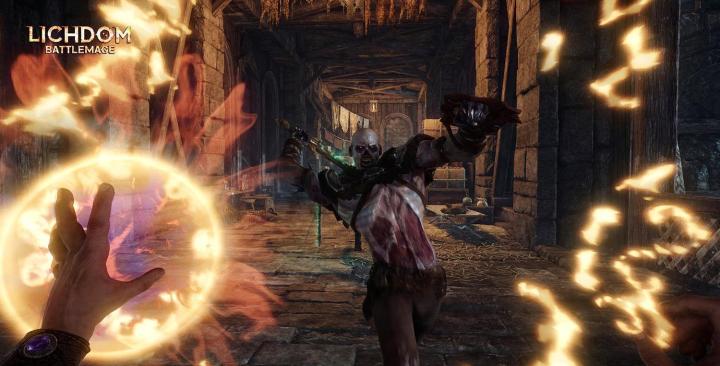
Most role-playing games let players define their roles with endless choices and customizations. Lichdom: Battlemage has one role – the “battlemage” – and players can take it or leave it.
This RPG from Georgia-based indie studio Xaviant is a Steam Early Access release that just went into its alpha phase. But the fundamentals of the game’s spell-based “violence equation,” as the developers refer to its combat, are just about ready for the public eye.
Story/Concept
Heart of violence. Lichdom: Battlemage is a first-person, combat-based RPG. What Xaviant showed of the story involved a mission to take down a powerful enemy, with the hero aided by a female character named The Gryphon. These roles can be reversed — i.e. you can play as the female character if you prefer, with the male aiding her — though the characters (voiced by well-knowns Troy Baker and Jennifer Hale) remain the same.

The story is not the focus, though; it’s combat at Lichdom‘s heart. This is not a typical single-player RPG, with a boring open world, pointless side quests, and hundreds of useless loot drops. Lichdom‘s levels are linear, and the only choices given to players involve the game’s deep spell-crafting system. That’s the hook: become a seriously powerful sorcerer, and screw everything else.
Shattering the glass cannon. Lichdom was built for people who love playing as mage characters but hate the limitations most games place on the class. For example, Xaviant wants to demolish the “glass cannon” trope, and this mage won’t fall after a few hits. “If magic was a real thing, then how does a guy with a sword even compete?” Xaviant founder and CEO Michael McMain said during our E3 demo.
There are no mana bars or cooldowns, so players can do their thing without running out of casts. And unlike in most RPGs, bosses in Lichdom are not immune to status effects (though if you hit them with too many they briefly become “enraged” and more dangerous). Xaviant wants every player to feel like an “unmitigated badass,” McMain said, though they’re conscious of creating a challenge as well.
Gameplay
Dive deep. The magic system revolves around a three-layer crafting system. At the core, players choose one of eight elements, or “Sigils”: fire, lightning, ice, telekinesis, and others still to be revealed.

The next layer determines how that element will be “shaped,” or delivered, and there are seven choices: a targeted single-enemy shot, a targeted area-of-effect, a local area-of-effect around the player, a ray that shoots in a straight line, a proximity trap, a grenade-like “lob,” and a “pool” that has persistent effects for enemies within a certain radius. Four of those seven were added in the run-up to E3, directly in response to Early Access player feedback, McMain said.
Finally, players can also choose an augment: destruction, which makes spells cause damage; control, which creates persistent effects; or mastery, which weakens enemies and causes them to act as “beacons” that have additional effects on other nearby foes.
It’s complicated, and that’s the point. But when you break it down, the effects are easy to understand. For example, a spell comprised of the ice Sigil shaped in the “pool” formation and augmented with control causes enemies who enter the spell’s radius to become frozen. A fire ray with the destruction augmentation deals damage, but adding mastery or control to that has different effects.

Overkill. The fun doesn’t stop there. Every point of damage you cause over the amount required to kill an enemy helps build up “overkill” points, which can be used to unleash strong spell combos, like a kinesis-meets-lightning that forms a deadly black hole singularity.
So yeah, this mage is powerful, and he or she can also take plenty of damage. Health is divided into three recharging segments, and Xaviant wants players to fight the instinct they may have developed in other RPGs to run backward while casting frantically at pursuing enemies. To that end there are two defensive moves that also have offensive potential: right-clicking activates a magic shield that, with expert timing, parries enemy attacks and causes damage; and the space bar activates a short-range “Blink” teleportation move that can be charged to release a damaging burst of spell power on enemies.
Presentation
The speed of Skyrim. Our E3 demo showcased a series of caverns filled with ice and lava, a snowy, enemy-occupied village, and the Maelstrom, a whirlpool that froze solid when the moon shattered some time before the game takes place. There the battlemage fought a giant crab boss aided by a horde of skeletons. Not exactly mind-blowing stuff, but it certainly looks pretty.

Combat flows at a pace that’s similar to Skyrim‘s. It looks slow when you’re watching, but it’s nice to have time to charge area spells, set traps, and in general do more than just lob fireballs. That said, if you do just want to shoot lightning or deadly ice crystals in the most straightforward way possible, that’s also OK. “It’s about you choosing where you want to live in that sort of violence equation,” McMain said.
And everything else is designed to not distract you from working on that equation. The interface is minimal, and loot is picked up automatically. Story elements seem few and far between (though there’s inevitably more to come in the final release), and so far there are no conversation trees or mini-maps in sight.
Takeaway
Lichdom might have benefitted from multiplayer, but McMain said they wanted to keep a tight focus. Trimming features, no matter how awesome they might have been, was an important part of the game’s development, and the result is admittedly stark. The game might also suffer from having too many options, especially since enemies don’t have weaknesses or strengths, despite the variety of elements at play. There’s nothing besides personal preference to recommend one spell over another in a given situation, which might make a lot of combinations feel redundant.
Then again, that subjectivity might be a plus for some players. Lichdom: Battlemage lets you play exactly how you like, as long as you like playing as a mage. The game’s alpha launched at the end of E3, and the beta is set to go six weeks after that. The wide release on PC, via Steam, is scheduled for August 26.
Editors' Recommendations
- The biggest gaming news of 2023: Insomniac leak, GTA 6 reveal, and more
- E3 is officially dead, as the ESA retires the historic gaming expo
- ESA denies E3 2024 and 2025 have been canceled, despite LA tourism board’s claims
- E3 2023 has officially been canceled by the ESA and ReedPop
- Ubisoft will not attend E3 2023, but it will still host a summer live stream




